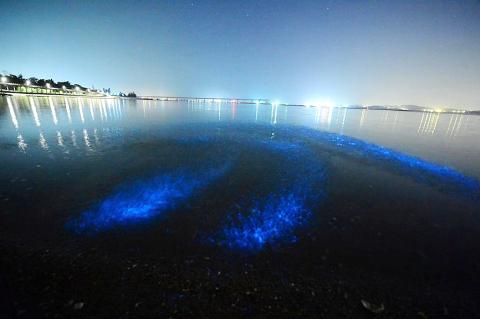Dubbed “blue tears” by local residents, bioluminescence along the shore of Kinmen in spring has become a major tourist attraction for the outlying county.
The natural phenomenon was first observed a long time ago, but has only become a popular tourist attraction since the county opened up its coastline to tourists in recent years, the Kinmen County Fisheries Research Institute said.
Blue tears are formed when clusters of bioluminescent marine algae are disturbed by waves, said Li Chia-fa (李家發), a lead researcher at the institute.

Photo: CNA, courtesy of the Kinmen Photographers’ Association
The phenomenon is prevalent in warm seawater in April and May.
In the past, blue tears were associated not with Kinmen, but the Matsu Islands of Lienchiang County, which was thought to be the only location in Taiwan where it occurred, the institute said.
Hsu Chin-hsi (許進西), who heads the Kinmen Photographers’ Association, said that Kinmen’s topography makes it easier for visitors to get up close to the natural phenomenon.
People can even hold the glowing algae in their hands, whereas in Matsu it can only be viewed in the distance from a beach, Hsu said.
Blue tears can only be seen clearly in near-pitch darkness. Even the moon affects visibility, the association said.
The research institute plans to introduce an ecological tour based on the phenomenon to educate the public about environmental protection and conservation, while addressing such issues as marine pollution, Li said.
People wanting to see blue tears can also visit a pond in Jiougang Borough (舊港) in Kaohsiung’s Mituo District (彌陀), where they have been seen.
News that sparkles were sighted in a pond in the borough was reported last year, but the site is hard to find and the terrain is difficult to traverse, leading to many instances of visitors falling into ditches or becoming lost, residents said.
Groups are visiting the area as news of the phenomenon spreads, residents said.
Jiougang Police Chief Ou Chien-ming (毆建銘) said that the police station has set up an area to provide instructions on how to get to the pond, as many people go there to ask for directions.
The station urged visitors to refrain from driving on the narrow paths near the pond and to drive slowly at night.
People should not get too close to the edge of the pond, as they might fall in, and should refrain from feeding fish in the pond, as it could harm the pond’s ecology, the station said.

Chinese Nationalist Party (KMT) Chairman Eric Chu (朱立倫), spokeswoman Yang Chih-yu (楊智伃) and Legislator Hsieh Lung-chieh (謝龍介) would be summoned by police for questioning for leading an illegal assembly on Thursday evening last week, Minister of the Interior Liu Shyh-fang (劉世芳) said today. The three KMT officials led an assembly outside the Taipei City Prosecutors’ Office, a restricted area where public assembly is not allowed, protesting the questioning of several KMT staff and searches of KMT headquarters and offices in a recall petition forgery case. Chu, Yang and Hsieh are all suspected of contravening the Assembly and Parade Act (集會遊行法) by holding

PRAISE: Japanese visitor Takashi Kubota said the Taiwanese temple architecture images showcased in the AI Art Gallery were the most impressive displays he saw Taiwan does not have an official pavilion at the World Expo in Osaka, Japan, because of its diplomatic predicament, but the government-backed Tech World pavilion is drawing interest with its unique recreations of works by Taiwanese artists. The pavilion features an artificial intelligence (AI)-based art gallery showcasing works of famous Taiwanese artists from the Japanese colonial period using innovative technologies. Among its main simulated displays are Eastern gouache paintings by Chen Chin (陳進), Lin Yu-shan (林玉山) and Kuo Hsueh-hu (郭雪湖), who were the three young Taiwanese painters selected for the East Asian Painting exhibition in 1927. Gouache is a water-based

Taiwan would welcome the return of Honduras as a diplomatic ally if its next president decides to make such a move, Minister of Foreign Affairs Lin Chia-lung (林佳龍) said yesterday. “Of course, we would welcome Honduras if they want to restore diplomatic ties with Taiwan after their elections,” Lin said at a meeting of the legislature’s Foreign Affairs and National Defense Committee, when asked to comment on statements made by two of the three Honduran presidential candidates during the presidential campaign in the Central American country. Taiwan is paying close attention to the region as a whole in the wake of a

OFF-TARGET: More than 30,000 participants were expected to take part in the Games next month, but only 6,550 foreign and 19,400 Taiwanese athletes have registered Taipei city councilors yesterday blasted the organizers of next month’s World Masters Games over sudden timetable and venue changes, which they said have caused thousands of participants to back out of the international sporting event, among other organizational issues. They also cited visa delays and political interference by China as reasons many foreign athletes are requesting refunds for the event, to be held from May 17 to 30. Jointly organized by the Taipei and New Taipei City governments, the games have been rocked by numerous controversies since preparations began in 2020. Taipei City Councilor Lin Yen-feng (林延鳳) said yesterday that new measures by